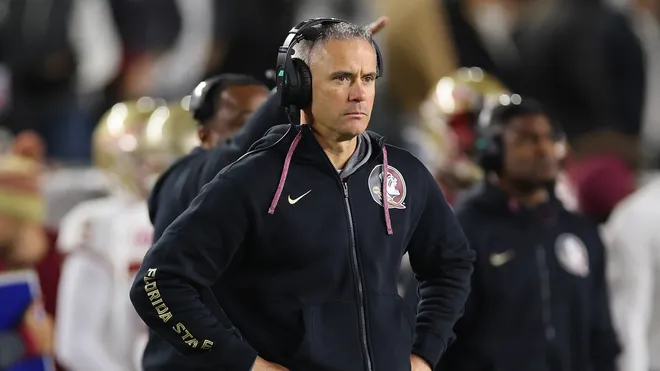The college football recruiting landscape, ever-dynamic and frequently unpredictable, delivered a significant jolt on Monday with the news of a pivotal four-star prospect, Jaylen Scott, flipping his commitment from Florida State to Auburn. This move, a high-stakes development for both programs, instantly reshapes early projections for the 2027 recruiting cycle, underscoring the relentless battle for elite talent, particularly within the talent-rich Southeastern Conference footprint. For Auburn, Scott’s decision is an unmitigated triumph, a clear signal that Hugh Freeze and his coaching staff are not only capable of securing top-tier prospects but are also adept at navigating the intricate web of relationships and influences that define modern recruiting battles. Conversely, for Florida State, it represents a tangible loss of a high-priority target, a setback that demands immediate recalibration on their recruiting board.
Jaylen Scott, a safety hailing from Williamson High School in Mobile, Alabama, is more than just another name on a commitment list. He is a premier defensive back talent, recognized widely across recruiting services as a four-star prospect. His rankings speak volumes about his potential: 247Sports, for instance, places him as high as the No. 90 overall player nationally, the No. 9 safety, and crucially, the No. 5 player from the state of Alabama for the 2027 class. The industry-generated 247Sports Composite mirrors this high regard, listing him at No. 171 overall, No. 15 among safeties, and No. 6 in Alabama. These metrics indicate a player with the athleticism, instincts, and physical tools to be an impactful contributor at the collegiate level, likely a cornerstone piece for any defensive scheme. His sophomore season statistics at Williamson further highlight his capabilities, where he recorded an impressive 107 tackles, coupled with 12 pass breakups and four interceptions, demonstrating his ability to be both a disruptive force against the run and a ball-hawking presence in coverage. This versatility makes him a coveted asset, capable of playing various roles in the secondary, from a deep safety to a nickel defender, allowing defensive coordinators significant flexibility in their schemes.
Scott’s initial commitment to Florida State in January had been a notable win for the Seminoles, a program also striving to assert its dominance in recruiting. However, the nature of early commitments in college football is inherently fluid, often subject to ongoing recruitment efforts from other programs and evolving relationships with coaching staffs. Auburn, under the leadership of Hugh Freeze and specifically safeties coach TJ Rushing and defensive coordinator DJ Durkin, launched an aggressive and persistent pursuit of Scott following their initial offer in March. This sustained effort, marked by multiple visits to the Plains, ultimately proved decisive. Scott’s decision to flip underscores the paramount importance of sustained relationship building in recruiting, where continuous engagement and a genuine connection with prospects and their families can often outweigh initial pledges, particularly those made so early in a recruit’s high school career.
The reasons behind Scott’s flip are multi-faceted, painting a picture of a recruit drawn to a combination of factors that Auburn meticulously cultivated. Foremost among these was the unwavering attention and consistent communication from Auburn’s coaching staff, especially TJ Rushing. Scott explicitly stated that Coach Rushing “has been with me through the whole thing from start to finish,” emphasizing the personalized and dedicated approach taken by the Tigers. This hands-on recruiting style, where a prospect feels genuinely prioritized and wanted, is a hallmark of successful programs. Beyond coaching relationships, Scott cited the “environment and culture” at Auburn as a significant draw. Recruits often speak of a “feel” or a “vibe” that resonates with them during visits, and for Scott, the atmosphere at Auburn, particularly during events like spring practice and the A-Day game, left a profound impression. He noted, “Every time I come to the Plains it gets better and better. The environment, the staff, the coaches everything just screams to be a Tiger.” This subjective, yet powerful, connection to the institutional identity is a key differentiator in high-stakes recruiting battles.
Another compelling factor for Scott was the opportunity to stay close to home. Hailing from Mobile, Alabama, the allure of playing college football in his home state, where his family could easily attend games, was a significant consideration. Scott acknowledged this, noting that his parents had long favored Auburn and that watching “Iron Bowls in front of the TV every time it came on” was a cherished childhood memory. He even articulated a mantra that resonates deeply within state lines: “The best DBs in the state stay in the state.” This regional pride and the desire to represent his home state at a high level undoubtedly played a role in his final decision, making the commitment not just a personal choice but a deeply rooted cultural one. Auburn’s staff expertly leveraged this connection, highlighting the benefits of remaining in Alabama and contributing to a program with deep ties to the state’s football heritage. The vision for Scott on the field, where Auburn envisions him fitting into the defense as either a nickel or a safety, further solidified his confidence in the program’s plan for his development and future impact.
For Auburn, securing Jaylen Scott is a monumental win with widespread implications. As the first commitment for their 2027 recruiting class, Scott’s pledge immediately sets a high standard and provides a significant boost to the class’s early momentum. In the world of recruiting, where early commitments can create a domino effect, landing a four-star in-state talent as the initial piece is a dream scenario for any coaching staff. It signals to other top prospects in Alabama and across the Southeast that Auburn is a program where elite players are choosing to begin their collegiate careers, creating a positive perception that can lead to further commitments. This is particularly crucial for Hugh Freeze, who is working diligently to rebuild Auburn into a consistent contender in the SEC. Stacking high-caliber recruiting classes is the foundational step in achieving that goal, and Scott’s commitment represents tangible progress in that strategic endeavor. His addition strengthens the defensive backfield, an area of constant need in the pass-happy SEC, providing a future cornerstone for DJ Durkin’s defensive unit.
Conversely, for Florida State, Scott’s flip is a definite setback. Losing a highly-rated, in-state prospect who was initially committed is never ideal, forcing the Seminoles to re-evaluate their options and intensify their pursuit of other targets at the safety position for the 2027 class. While Florida State has its own recruiting successes and a strong program history, this particular outcome highlights the intense competition they face, especially from SEC programs, for local talent. It underscores the ongoing challenges of maintaining commitments in the era of the transfer portal and fluid recruiting, where programs must continuously reaffirm their appeal to prospects. The loss could also have a minor ripple effect on Florida State’s class ranking, though it’s still very early in the 2027 cycle, allowing ample time for the Seminoles to recover and bolster their class with other talented players.
Beyond the immediate impact on both programs, Scott’s flip serves as a broader illustration of several key dynamics shaping contemporary college football recruiting. Firstly, it reiterates the escalating importance of personal relationships and authentic connections between coaches and recruits. In an age where NIL (Name, Image, and Likeness) deals and other external factors increasingly influence decisions, the human element of recruiting, centered on trust and genuine interest, remains paramount. Secondly, it highlights the fierce battle for in-state talent, particularly in states like Alabama and Florida, which consistently produce an abundance of high-level prospects. Programs understand that dominating their home recruiting grounds is fundamental to long-term success. The “best in the state stays in the state” sentiment articulated by Scott is a powerful force that programs like Auburn actively seek to leverage. Thirdly, the flip underscores the inherent fluidity of verbal commitments, especially those made years in advance of National Signing Day. Until a prospect signs a National Letter of Intent, their commitment remains non-binding, allowing for intense, ongoing recruitment from other schools. This constant competition means that recruiting is a year-round, never-ending endeavor, demanding continuous effort and strategic adaptation from coaching staffs.
In conclusion, Jaylen Scott’s flip from Florida State to Auburn is more than just a headline; it is a significant moment in the evolving 2027 recruiting cycle. For Auburn, it’s a statement win, signaling strong momentum, validating their recruiting strategy, and providing a foundational piece for their future defensive backfield. For Florida State, it’s a challenge, forcing them to regroup and intensify their efforts in a highly competitive landscape. Ultimately, this high-profile flip encapsulates the relentless, relationship-driven, and ever-competitive nature of college football recruiting, where every commitment is a hard-fought battle that shapes the destiny of programs for years to come. Scott’s journey to the Plains represents a testament to Auburn’s persuasive power and an exciting harbinger of the talent Hugh Freeze is assembling to restore the Tigers to national prominence.



